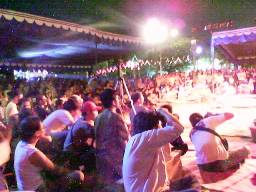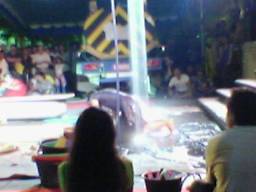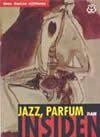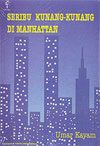
Some says, you are what you think you are, or you are what you eat. But, do you have a price tag that defines you?
In my line of work, the professional capacity and capabilities of a person is measured by the nominal value of a project that s/he manages. Once you've handled a 10 billion Rupiah (around 1 mio USD), for sure you would like to experience the feeling of handling 20 billion Rupiah project. Then people will pay more respect.
If you went to an interview, people would ask you how much was your budget? Did you plan your own budget? How many team members do you have? How do you manage your funds? During a casual get-together dinner with friends, a leisure after-hour talk turned into "the-amount-of-project-proposal-that-I-am-working-on".
In a country with USD 3,700 GDP per capita (2005) and 27.1% of its population ive below the poverty line (1998), and had to spare at least 56.2 of its GDP to pay foreign debts, having the financial capacity to give away a 40" flat panel LCD HD TV (around USD 4,000) as a gift to a family member will surely put you on center stage.
Money. The amount that you manage at work. The fatness of your savings and salary. It seems to be a big deal. We are chewing that money. Our flesh and blood are made of it. At least that's how I reflect the recent Eid Holiday that gets very interesting.
A local newspaper noted that intercity bus illegally increase its ticket fee high above government-approved fee. The bus co-driver said, "You don't like it? You want to report it to the police? Go ahead!" And most of our holiday budget went to transportation cost.
Rice cake is a side dish made of rice cooked in coconut leaves. It's always available on Eid Holiday. A rice cake maker said that s/he no longer received any rice cake order 3 days before Eid Holiday because they are overwhelmed with the orders. The thing is, with current income rate (thanks to GDP growth?), you can find rice cake anytime of the year. Not to mention other side dishes that accompanying the rice cake.
I can hardly understood those who put all their efforts to order those rice cakes and manage to queue for hours to buy last minutes groceries to make additional dishes for the rice cake dish. Anything goes for Eid Holiday.
If the whole idea of Eid Holiday is about giving and purging sins, I'm a bit distracted by the increased sale of motorcycle near Eid Holiday. The augmented price of gasoline has caused a pretty steep increase in transportation costs. Ticket fees for land, air and sea transports increased more than 20% compared to last year's rate. That's a pretty significant increase if your air ticket cost 100 USD last year and it becomes 150 USD this year. Those who cannot afford mass transportation chose private transportation mode. The cheapest is motorcycle. Yeah, that 125cc motorbike with two wheels and nothing else to protect your body parts.
The sale of these motorbikes always increase near Eid Holiday, so does the rate of road accidents among motorbikes.
Is it for the sake of purging sins and being reborn again?
Is it to impress others?
Is it state failure to improve the wealth of its citizens?
Is it pure lust?
Anyways, show me the money, then let's forgive each other and wish happy Eid *wide evil grins*
Labels: culture, holiday
 Temen gue punya keluarga besar sarat rutinitas adat dan budaya. Mereka setia memeliharanya hingga jaman moderen. Kali ini ada cerita tentang kuburan. Biasanya, tentang arisan yang bisa berjalan sekian kali dalam sebulan dengan dress code tertentu yang harus dipatuhi.
Temen gue punya keluarga besar sarat rutinitas adat dan budaya. Mereka setia memeliharanya hingga jaman moderen. Kali ini ada cerita tentang kuburan. Biasanya, tentang arisan yang bisa berjalan sekian kali dalam sebulan dengan dress code tertentu yang harus dipatuhi.


 I attended his book launching because I read most of his books. There's something about his writing that tickles me. It's a subjective thing. He's one of few Indonesian writers whose stories always set in urban settings. Compared to his peers, his works are the most published in any sorts - be that novels, comics or columns.
I attended his book launching because I read most of his books. There's something about his writing that tickles me. It's a subjective thing. He's one of few Indonesian writers whose stories always set in urban settings. Compared to his peers, his works are the most published in any sorts - be that novels, comics or columns.











